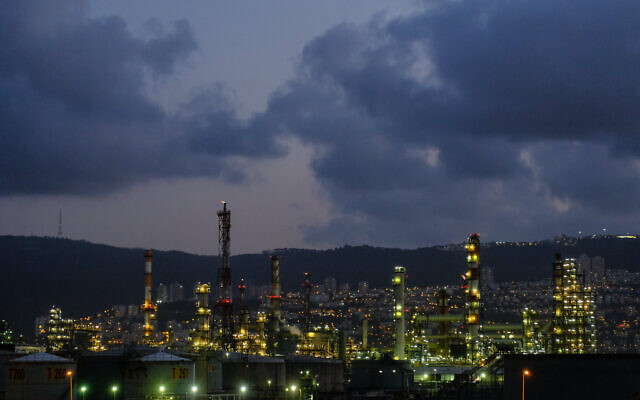In wake of High Court petition by green group, ministry publishes results of PFAS sampling, draft of PFAS regulations for hazardous waste permits
By Sue Surkes
Synthetic, long-lasting chemicals that are harmful to human health have been found in significant quantities in Israeli factories, sewage treatment plants, landfill sites, and even streams, according to a new report by the Environmental Protection Ministry.
Testing between 2021 and 2023 revealed PFAS compounds in 24 out of 29 factories sampled, 13 out of 23 sewage treatment plants, four out of five landfill sites, and four out of eight streams.
Per- and poly-fluoroalkyl substances (PFAS) are a group of chemicals used in coatings and products to resist heat, oil, stains, grease, and water.
They can be found in everything from waterproof fabrics and food packaging to firefighting foam, AstroTurf, Teflon-coated kitchenware, carpets, refrigerators, electrical devices, cosmetics, adhesive bandages, and dental floss.
These substances are known as “forever chemicals” because they don’t break down and eventually enter the environment, as well as the bodies of humans and other animals.
Get The Times of Israel’s Daily Edition by email and never miss our top stories
By signing up, you agree to the terms
They can enter the human body via food, drink, inhalation, and skin.

According to the US Environmental Protection Agency, current peer-reviewed research indicates that exposure to certain levels of PFAS may affect human reproduction and children’s birth weight and development, increase the risk of some cancers, and interfere with natural hormones and the immune system.
The Israeli Health Ministry recently found compounds in 13 percent of groundwater wells tested and closed two wells as a result.
Internationally, these chemicals have been regulated by the Stockholm Convention on Persistent Organic Pollutants since 2009.
Some countries, such as France, are trying to restrict the production and sale of certain products containing PFAS, although manufacturers are pushing back, as they are in the European Union.

The Associated Press reported in April that the US Environmental Protection Agency finalized limits on certain common types of PFAS chemicals in drinking water.
Israel, like the US, has not even ratified the convention.
Both the Health Ministry and the environmental advocacy organization Adam Teva V’Din pressed for years for the Environmental Protection Ministry to regulate the use of forever chemicals by defining what is allowed or not in permits for hazardous materials and by ratifying the Stockholm convention.
After an interministerial committee on the subject produced a work plan and timetable that were not implemented, Adam Teva V’Din petitioned the High Court in December 2022 to force the ministry’s hand.
The court is monitoring the ministry’s activity and has asked for an update by September 24.

Meirav Abadi, responsible at Adam Teva V’Din for the economy and regulation, said, “There’s no disagreement here on the risks of PFAS, their presence, or the need to deal with them. But the ministry has been dragging its feet.”
“Its slow handling of this issue is disproportionate to the size of the public health risk,” she went on. “How can it be that factories are using super dangerous chemicals and nothing has been done? As of today, hazardous material permits don’t relate to PFAS at all.”
The publication of the sampling results on Sunday was accompanied by a draft policy on PFAS handling for public consultation.
The test results published Sunday showed PFAS levels to be particularly high at petrochemical and oil refinery plants but to also be present at factories manufacturing detergent, fertilizers, solvents, and paper, at locations treating hazardous waste, and in wastewater from military camps.

The ministry said these compounds end up in agricultural irrigation, streams, and the sea.
Of the eight streams tested, the Kishon and Saadia streams that run through Haifa’s industrial area in northern Israel had the highest levels. They were followed by the Lachish Stream, which drains into the Mediterranean at the southern city of Ashdod, and the Hadera Stream in central Israel.

No traces of PFAS were detected in the Alexander Stream or Yarkon River in central Israel, the Hebron Stream (in southern Beersheba), or the Naaman Stream in the country’s north.
“The main way of reducing contamination from PFASs is prevention at source,” the ministry said in a statement.
The draft policy, the statement added, aimed to reduce the scope of PFAS use, ensure maintenance and control of equipment containing the compounds, treat PFAS waste, and sample and monitor PFAS concentrations in industrial wastewater.




